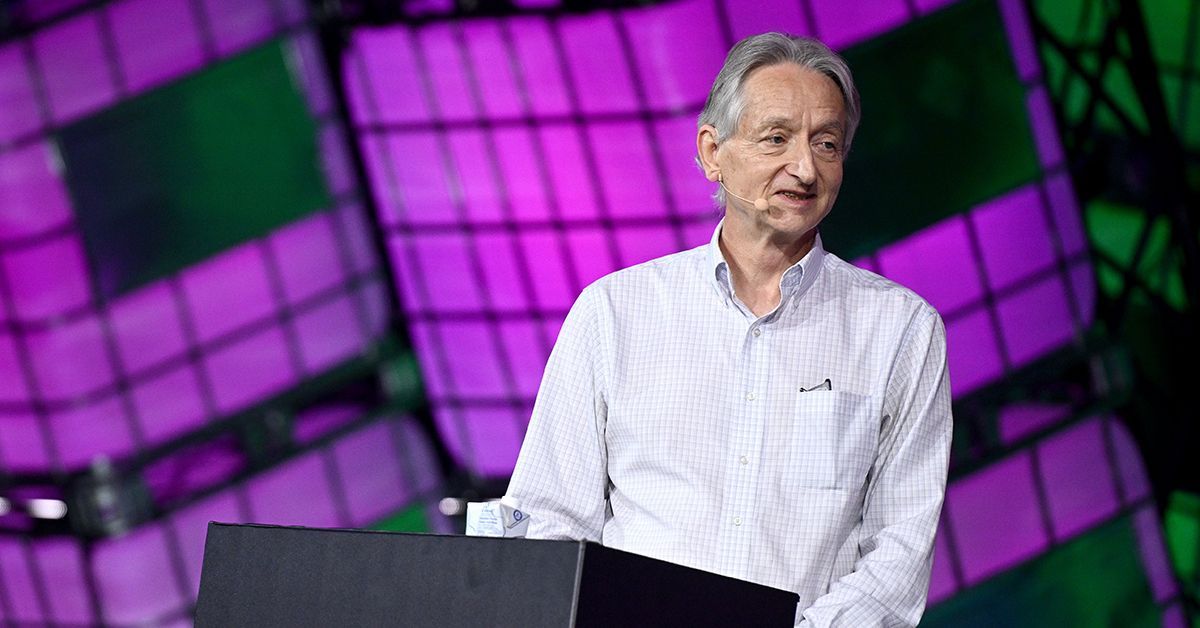Nobel Prize Winner, ‘Godfather of AI’ Geoffrey Hinton Has UC San Diego Roots
Story by:
Published Date
Story by:
Topics covered:
Share This:
Article Content
British-Canadian scientist Geoffrey Hinton, widely called the “godfather of AI” who is also one of the technology’s most vocal critics, has been awarded the 2024 Nobel Prize in Physics for his pioneering work in artificial intelligence.
Hinton, who shares the prize with Princeton University’s John Hopfield, was cited for foundational work that powers current AI systems in chatbots such as ChatGPT. The work has roots at UC San Diego.
Hinton’s connections to the university go back to his postdoctoral research in the late 1970s and early 1980s in the UC San Diego Department of Psychology, working with an interdisciplinary group of cognitive psychologists, linguists and others who would go on to found the world’s first Department of Cognitive Science in the School of Social Sciences.
Currently a professor at the University of Toronto, Hinton first worked at UC San Diego as a visiting scholar from 1978 to 1980 and then returned in the spring of 1982 as a visiting assistant professor.
“Geoffrey Hinton’s Nobel Prize in Physics for his transformative work in artificial intelligence is well-deserved,” said Chancellor Pradeep K. Khosla. “I am particularly proud that his academic journey has deep roots here at UC San Diego, where he conducted postdoctoral research and taught as a young scholar.”
At UC San Diego, Hinton was part of the Parallel Distributed Processing (PDP) group, led by David Rumelhart and James McClelland, which sought to understand cognitive processes like learning and memory through networks of processing units inspired by neurons. The PDP work, described in a two-volume book by Rumelhart and McClelland, promoted interest in neural networks when many scholars had dismissed their potential.
Critically, the PDP group’s work laid the foundation for the development of backpropagation, a key algorithm Hinton would later popularize with Rumelhart and Ronald Williams in their influential 1986 Nature paper. Backpropagation made possible the deep learning of complex, multi-layered patterns – like the complexities of human language – and enabled efficient training of large neural networks. Backpropagation is now the basis of most modern AI systems.
Hinton’s work on Boltzmann machines – a type of neural network drawn from a concept in physics specifically cited by the Nobel Prize committee in making the award – was co-developed with Terrence Sejnowski, another key figure at UC San Diego and the Salk Institute. One influential joint paper by Hinton and Sejnowski, with David Ackley, was “A Learning Algorithm for Boltzmann Machines” published in Cognitive Science in 1985.
Boltzmann machines introduced probabilistic approaches to understanding learning and memory, influencing AI models’ ability to learn patterns and relationships in complex data.
“John Hopfield and Geoffrey Hinton were awarded the recent Nobel Prize in Physics for the development of learning algorithms for neural network models in the 1980s. This prize also recognizes the community of researchers that built on their advances over the last 40 years,” said Sejnowski, now a distinguished professor with the School of Biological Sciences and with the Salk Institute. “The practical applications today in AI had to wait until vastly more computer power and training data to became available.”
In addition to the Nobel Prize, Hinton has been honored with several other prestigious awards, including the 2018 Turing Award (nicknamed the “Nobel Prize in Computing”) and the 2022 Golden Goose Award.
Nearly two decades earlier, in 2001, Hinton’s work also earned him the very first Rumelhart Prize, established by UC San Diego cognitive psychology alumnus Robert Glushko. This award, commonly known as the “Nobel Prize of Cognitive Science,” was also awarded to another of Hinton’s colleagues at UC San Diego, neural networks pioneer Jeffrey Elman.
Hinton has publicly acknowledged how critical his time at UC San Diego was in shaping his thinking about AI. His experiences at UC San Diego helped launch a career that would influence AI for decades, through many contributions at institutions like Carnegie Mellon University and then the University of Toronto.
Hinton also worked at Google before leaving the company in 2023 to more freely critique the AI technology he helped create.
One of Hinton’s first reactions on winning the Nobel Prize was to sound a word of caution about AI: “I think it’s very important right now for people to be working on the issue of how will we keep control?” Hinton said. “We need to put a lot of research effort into it. I think one thing governments can do is force the big companies to spend a lot more of their resources on safety research.”
Learn more about research and education at UC San Diego in: Artificial Intelligence
You May Also Like
Stay in the Know
Keep up with all the latest from UC San Diego. Subscribe to the newsletter today.




